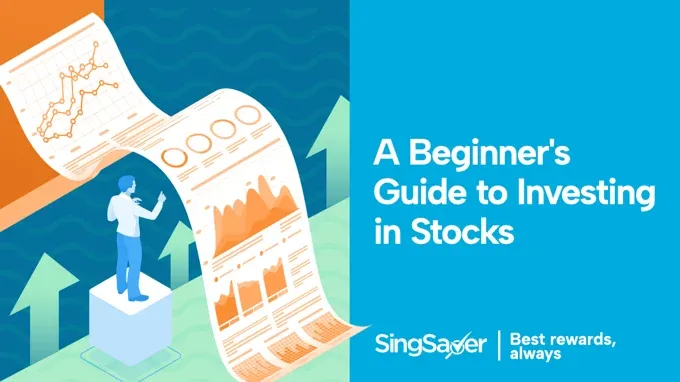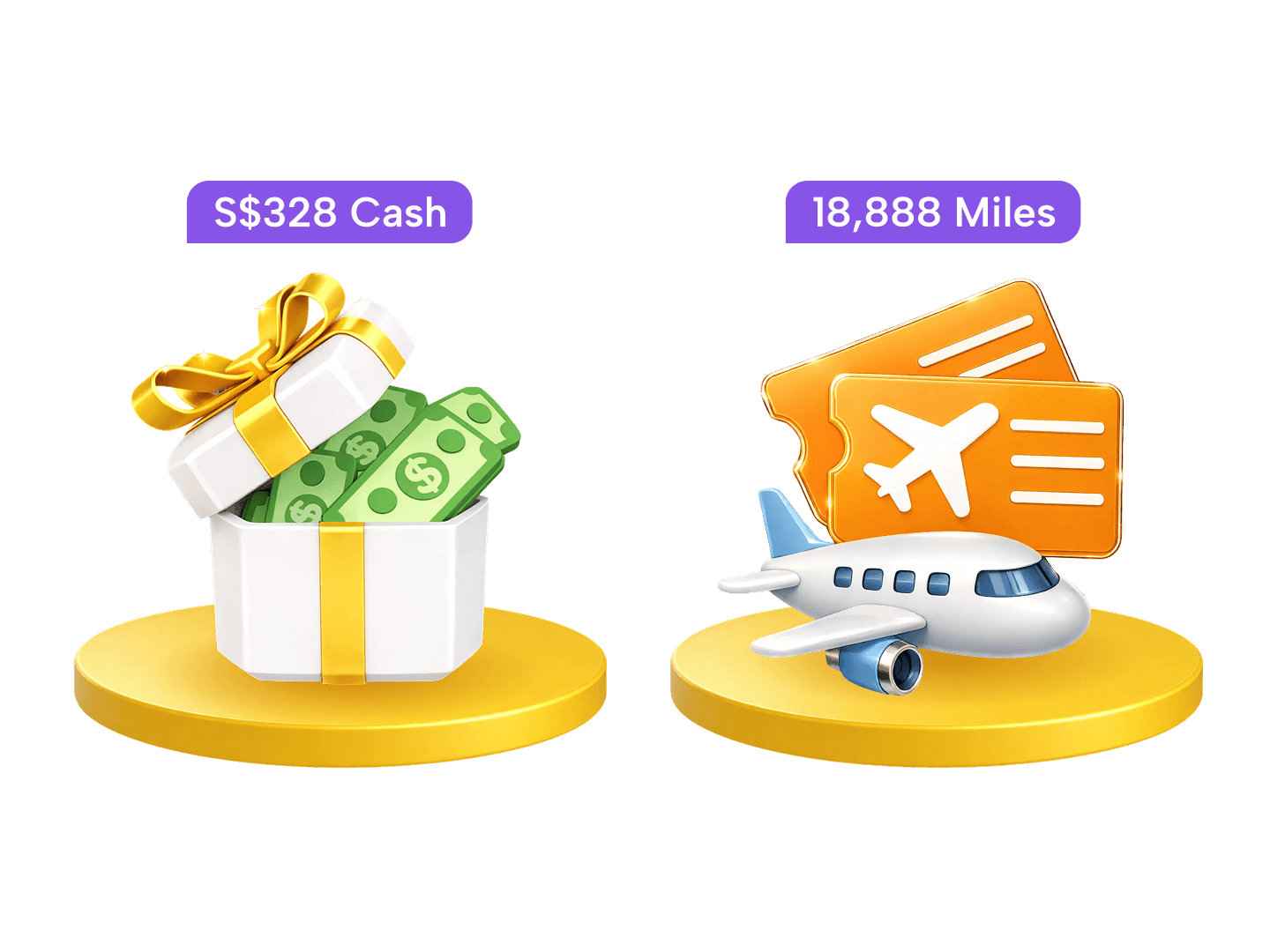How To Buy, Trade and Invest in Stocks in Singapore
Updated: 25 Sept 2025
A guide for how to buy, trade and invest in stocks in Singapore for beginners. From selecting a brokerage account to researching potential stock market investments.

Saver-savvy tips
-
Investing in stocks essentially means becoming a part-owner of a publicly listed company. These ownership stakes are represented by shares of stock.
-
If the company's value increases, the value of your stock may also rise, potentially leading to profits when you sell those shares.
-
Most individuals in Singapore invest in stocks through online platforms provided by brokerage firms. You can also gain exposure to the stock market through investment funds that contain multiple stocks within one financial product.
Investing in stocks is a common strategy for those in Singapore looking to grow their wealth. It involves purchasing shares in publicly traded companies, with the expectation that their value will increase over time/
One of the most accessible ways for beginner investors to learn how to invest in stocks is by opening an online investment account with a Singapore brokerage and start trading stocks through their platform.
Many brokerages even allow you to open accounts with minimal or even no initial deposit, so you don't need a substantial amount of capital to begin your investing journey in Singapore. Some may even offer fractional share trading, enabling you to buy portions of expensive stocks and enhancing the profile of your investment portfolio.
» Learn More: What is a brokerage account?
SingSaver Exclusive Offer
Compare top brokerages on SingSaver, apply in minutes, and earn rewards, including up to S$500 cash, premium products like Apple AirPods 4 or Dyson devices worth around S$600, or exclusive provider gifts worth over S$13,000. Valid till 1 March 2026. T&Cs apply.
7 easy steps for beginners to start investing in stocks
Investing in stocks doesn’t have to be intimidating.
Start by opening an online brokerage account, adding money to it, and purchasing a stock or investment fund—congratulations! You’ve just invested in your first very stock(s). Robo-advisors or financial advisors can even help you select a stock or fund based on your risk appetite and investment goals, making it even easier to get started.
Ready to get started? We’ve broken the stock investing process down into seven easy-to-follow steps for a beginner-friendly investment journey.
» Learn More: Best brokerage accounts for online stock trading in Singapore
1. Choose how you want to invest your money
There are several approaches you can adopt for stock investing. Choose the one that best suits your comfort level and investment style.
I want to practice investing without any real capital involved.
If you're new to stock trading for beginners, you might feel hesitant to risk your own money immediately. Many brokerage platforms offer demo accounts or paper trading features. These allow you to practice buying and selling stocks with virtual currency, providing a risk-free environment to learn the basics and develop your trading skills.
I want to choose my own investments, stocks, and funds.
If you prefer to have direct control over your investment decisions, you can open a brokerage account and select individual stocks or funds yourself. This will require research and active management of your portfolio. The following sections of this blog will guide you through the process and demystify it for you.
I would like some kind of external assistance with portfolio management.
For those who prefer a more hands-off approach, robo-advisors offer automated portfolio management services. These are available via banks (e.g. DBS digiPortfolio, OCBC RoboInvest, UOBAM Robo-Invest) or dedicated platforms such as StashAway, Syfe, and Endowus. Robo-advisors use algorithms to build and manage diversified portfolios based on your risk tolerance and financial goals.
You can also engage a human financial advisor to manage your portfolio and provide financial advice based on the latest market changes.
I would like to try investing with my CPF or SRS.
If you’re Singapore and have a CPF account you can also consider investing a portion of your savings through the CPF Investment Scheme (CPFIS) or Supplementary Retirement Scheme (SRS). These schemes offer specific and accessible investment options for retirement planning, drawing on the funds in your Ordinary Account and/or Special Account.
» Learn More: What is the CPF Investment Scheme (Original Account) and how does it work?
2. Choose a broker or robo-advisor that fits your financial needs and appetite
Choosing a broker for investing on your own
First, you'll need to choose an online brokerage platform to buy and sell shares.
Compare different brokerage accounts to find one that suits your needs and budget. Key factors to consider include:
-
Fees: Compare commission charges, platform fees, and any other associated costs.
-
Variety of investment options: Ensure the broker provides access to the Singapore Exchange (SGX) and any other international markets you wish to trade in (e.g. pick a brokerage ideal for buying US stocks if you want to dip your toes into the US market).
-
Features of the trading platform: Evaluate the platform's user-friendliness, trading tools, and mobile app capabilities.
-
Research and analysis resources: Look for brokers that offer research reports, market data, and educational resources to support your investment decisions.
-
Customer support: Assess the availability and responsiveness of customer service channels.
Some popular choices in Singapore include:
-
DBS Vickers: Offers a wide range of investment products and research tools.
-
Saxo Markets: Provides access to global markets and advanced trading platforms.
-
FSMOne: Offers a user-friendly platform with a focus on mutual funds and ETFs.
» Learn more: Best online brokerage accounts for stock trading in Singapore
Investing through robo-advisors
Robo-advisors are automated platforms that can provide recommendations for stock selection while automatically managing your portfolio—giving you a hands-free, easier investing experience. Some even have features for portfolio rebalancing or financial planning to support your overall financial goals better.
If you opt for a robo-advisor, consider the following:
-
Management fees: Compare the annual fees charged by different robo-advisors, typically expressed as a percentage of your assets under management.
-
Investment strategies: Understand the robo-advisor's investment methodology and the types of portfolios they offer.
-
Minimum investment: Check the minimum deposit required to open an account.
-
Customer support: Evaluate the availability of customer support and any financial planning features offered.
Leading robo-advisors in Singapore include StashAway, Syfe, and Endowus, as well as robo-advisors from major banks like DBS, OCBC, and UOB.
» Learn more: Best robo-advisors and robo-investors in Singapore
SingSaver x Saxo Markets Exclusive Offer
Get S$328 Cash and 18,888 Max Miles by Heymax (worth S$340) when you sign up for a Saxo Markets account, fund a min. of S$5,000, maintain the funds for 30 days from date of deposit, and make at least 3x trade within 14 days of account opening. Valid till 1 March 2026. T&Cs apply.
Saver-savvy tip
Remember that a brokerage account is simply a vehicle for your investments. You'll need to deposit funds and actively purchase securities like stocks or funds to see potential growth.
3. Pick a type of investment account
Whether you choose a broker or a robo-advisor, you'll need to select the appropriate type of investment account. In Singapore, common account types include:
-
Cash account: The most common type, where you deposit cash to buy and sell securities.
-
Custodian account: Where a custodian (usually a bank) holds your securities for you. SRS accounts are a type of custodian account.
-
CDP-linked account: Your securities are held in Central Depository (Pte) Limited (CDP), Singapore's securities depository. You'll need this to trade directly on the SGX.
-
CPF investment account: Allows you to invest in stocks and other approved investments using your CPF funds under the CPFIS scheme.
The type of account you choose will depend on your investment goals and needs. For example, if you're saving for retirement, an SRS account might be suitable. If you plan to actively trade on the SGX, a CDP-linked account will be necessary.
Signing up for an account on any of these platforms typically involves providing personal information and verifying your identity. You may also need to meet certain eligibility criteria, such as:
-
Age: Most platforms require you to be at least 18 years old to open an account.
-
Residency: You'll typically need to be a Singapore resident or citizen.
-
Financial requirements: Some platforms may have minimum deposit or income requirements.
|
DBS digiPortfolio |
Endowus |
Syfe |
|
SingSaver rating 3.5/5 |
SingSaver rating 3/5 |
SingSaver rating 4/5 |
|
Min. annual management fee 0.75% |
Min. annual trading fee 0% |
Min. annual trading fee S$0 |
|
Account minimum S$1,000 |
Account minimum S$1,000 |
Account minimum S$0 |
Ultimately, mutual funds and ETFs offer built-in diversification, which helps to reduce risk. While individual stocks offer the potential for higher returns but also carry greater risk. You may weigh the benefits and disadvantages of either option differently based on your financial situation, financial goals, and risk tolerance.
5. Set a budget for your stock market investment
When you're ready to buy shares, you'll need to place an order through your brokerage platform.
There are two main types of orders:
-
Market order: This is the simplest type of order. You're instructing your broker to buy or sell shares at the best available current market price. Market orders are typically executed quickly, but the final price you pay may be slightly different from the price you saw when you placed the order, especially if the market is moving quickly.
-
Limit order: This type of order gives you more control over the price you pay. You set a specific price limit, and your broker will only buy or sell the shares if they can get that price or better. Limit orders may take longer to fill, or they may not be filled at all if the market doesn't reach your desired price.
How much money do I need to start investing in stocks?
The amount of your initial investment varies depending on the stock prices and your chosen broker. Some brokers in Singapore allow you to start with no minimum deposit or offer fractional share trading, enabling you to invest even with small amounts. ETFs can also be a cost-effective way to invest in stocks with a limited budget, as they are traded at a share price.
How much money should I invest in stocks?
There's no one-size-fits-all answer to this question. The ideal amount to invest in shares depends on your personal circumstances and financial goals, although a general rule is to only invest what you can afford to lose.
Here are some key questions to consider:
-
What are you saving for? Are you investing for a short-term goal like a down payment on a house, or a long-term goal like retirement?
-
How long do you have to achieve your goals? A longer time horizon (for example, if you’re saving for retirement) allows you to take on more risk and potentially earn higher returns. In such a situation, a larger allocation to stocks (through funds) may be appropriate.
-
Can you afford to lose some of your investment? Investing in shares always carries some risk, so it's important to only invest money you can afford to lose
Once you've considered these factors, you can start with a small amount and gradually increase your investment as you become more comfortable with the process. You can consider using a budgeting framework like the 50/30/20 rule to allocate funds for investing within your larger financial strategy.
6. Focus on the long-term outcomes of your investment, not just short-term changes
Stock market investments have historically been a strong driver of long-term wealth growth, measured in terms of years and even decades.
However, this does require weathering ups and downs in the short term. Avoid panic selling during market downturns—it’s possible that your stocks will go back up as the market improves. You may even see a dip in prices for several years but an overall gain within a 10-year period—all depending on the performance of the individual stock amidst changing market conditions.
If you’re concerned about market volatility, you can consider dollar-cost averaging. This entails investing a pre-determined amount of money every month no matter the actual stock price. The idea is that when the stock price is low, you’ll buy more shares, and when the stock price is high, you’ll buy less shares, all for the same amount of money. This helps build consistency in your investment strategy and bolsters your portfolio’s resilience against large market fluctuations.
Ultimately, investing in stocks means playing the long game. Unless you’re trying to succeed at options trading, resist the urge to obsessively check your portfolio daily. Focus on the long-term trend instead and give your money some time to recover from the occasional dips and falls.
7. Monitor and manage the performance of your stock portfolio and shares
After you've bought shares, it's important to monitor their performance regularly. Depending on the performance, you may need to periodically re-evaluate your asset allocation to optimise future gains. Such rebalancing can help you maintain your desired risk level.
If a Singapore-heavy portfolio isn’t performing as well as you’d like it even after six months or a year, for example, you may consider withdrawing some investments and re-investing in an international ETF that’s had more consistent growth.
Or if you’re changing your financial goals from building up short-term wealth to saving up for retirement, you may want to reallocate riskier stock investments to more conservative, reliable fixed-income investments such as bonds. This will better protect your portfolio from market risks.
To stay on top of your investments, be sure to subscribe to company news and earnings reports for any individual stocks you hold. You can usually track your investments through your brokerage account or use online portfolio trackers. And if the stock has reached your investment goals or if the company's performance deteriorates, consider selling your shares to optimise your overall returns.
To sum up: key things to know about stock trading for beginners
Learning how to invest in stocks can seem daunting, but it's achievable with a clear approach and the right tools.
Don’t be afraid to start with smaller amounts and diversify your holdings—take the time to build a strong foundation and gain confidence in your investments first.
Do your research and choose a brokerage platform or robo-advisor that suits your needs and streamlines your introduction to the investment game.
And remember that investing is accessible to everyone: you just need to determine your strategy and the appropriate investment instruments to meet your financial goals.
Saver-savvy tip
If you're considering opening a brokerage account but need more guidance, explore our resources that compare the best online brokers in Singapore based on fees, investment options, minimum balances, platform features, and more.
SingSaver x uSmart Exclusive Offer
Get an upsized S$130 Cash, a $150 eCapitaVoucher, or 9,000 Max Miles by Heymax (worth S$162) when you open a uSMART SG Account, and fund an initial single deposit of S$1,000 within the promotional period and maintain it for 30 days from the date of deposit. Valid until 1 March 2026. T&Cs apply.
Frequently Asked Questions About Stock Trading for Beginners
Yes, stock investing can be safe for beginners if approached responsibly. Investing isn't inherently complex, and many online resources are now available to help beginners. However, it's crucial to understand the risks involved so you can take measured, sensible first steps into the wide ocean of the market.
For beginners in Singapore, a good starting point is often diversified investment vehicles like ETFs, such as those tracking the STI. A robo-advisor can also help you build and manage your portfolio for a small fee, making the investment process much more hands-off and manageable for you.
Generally, yes, stock investing apps in Singapore are safe.
Always choose reputable apps from established brokerages or check if the app’s holding company has been approved by the Monetary Authority of Singapore (MAS), usually under the “Capital Markets Services” category. Gaining MAS approval means the app or organisation is beholden to MAS’ requirements and standards, offering investors a level of protection against mismanagement.
While your funds are usually safe, some newer apps may have occasional reliability issues. You can consider using the best investment apps for beginners and students that usually tend to be more established and less likely to face reliability issues.
Yes, many brokerages in Singapore have low or no minimum investment requirements and some offer fractional trading, allowing you to invest even with small sums. However, diversification becomes more challenging with smaller amounts as there just isn’t enough capital to spread across multiple assets.
ETFs can be a good option for beginners as they offer instant diversification even with a small investment.
It’s also important to remember that stock investing is a long-term strategy and should not take precedence over your immediate financial needs. If you’re still building up an emergency fund, for instance, that may be more relevant to securing your financial future compared to investing in stocks.
Regular investments, even small ones, can accumulate significantly over time due to compound interest. A long-term perspective is key. Rather than focusing on short-term gains from small upwards ticks in stock price, plan out a longer-term strategy and stick to it.
Yes, stocks are a good investment for beginners with a long-term mindset. It’s recommended to plan for earnings at least 5 years down the line, which should account for most market downturns or the occasional dip in stock price.
If you’re just building your stocks portfolio, focus on diversified products like ETFs rather than trying to time the market with individual stocks. Investing in ETFs saves you time and resources as you can directly spread your investment over multiple assets instead of individually researching each and every stock individually.
For most beginners, low-cost index funds and ETFs are often considered good starting points. They offer instant diversification and track market benchmarks, fortifying your portfolio against market shocks. Relying on a market benchmark also means your performance is tied to the market itself—as it grows, so does your portfolio. And if the market takes a hit, your bundle of stocks can insulate you against a large shock compared to individual stock investors.
Start by considering how much risk you're willing to take to achieve your investment goals. Identifying a promising company early on can lead to significant gains, but remember that not all companies live up to their potential.
Think about the types of companies you're comfortable investing in. Are you drawn to large, stable companies with a long track record? Or are you more interested in smaller, high-growth companies with greater potential but also higher risk?
Once you've identified some promising companies, delve deeper into their financials. Examine their annual reports and financial statements to assess their overall health and stability. It's crucial to understand their business model, how they generate revenue, and their future plans.
Consider the sectors and industries that align with your investment strategy. Are you interested in specific sectors like technology, healthcare, or finance? Diversifying across different sectors can help reduce risk and potentially enhance returns.
Remember, investing in individual stocks requires careful research and analysis. If you're not confident in your stock-picking abilities, consider investing in mutual funds or ETFs, which offer instant diversification and professional management. You can also consider alternative asset classes such as short-term or long-term fixed deposits.
For beginners, investing in a diversified ETF is often recommended. If you want to pick individual stocks, allocate a small portion of your portfolio and research thoroughly. Blue chip stocks are regarded as some of the best stocks for beginners due to their strong brand recognition, high dividends, and stable financial performance.
No, stock trading (short-term buying and selling) is generally not recommended for beginners. It requires a lot more fundamental analysis and dedicated research into specific stocks, which can be confusing for beginners or those with limited time and resources. Long-term investing in diversified funds is a safer and more effective strategy for most new investors.
⚡SingSaver x Tiger Brokers Flash Deal⚡
Open a Tiger Brokers account and fund a minimum amount of USD 1,000 within the promotional period to receive an upsized S$160 cash, S$180 Grab voucher, 10,000 upsized Max Miles by HeyMax (worth S$180), or Apple AirPods Gen 4 (worth S$199). Offer is stackable with Tiger Brokers' welcome offer. Valid till 1 March 2026. T&Cs apply.
Find the right brokerage company for you
Compare fees, platform features, and more across the top brokerage accounts for online trading in Singapore.




